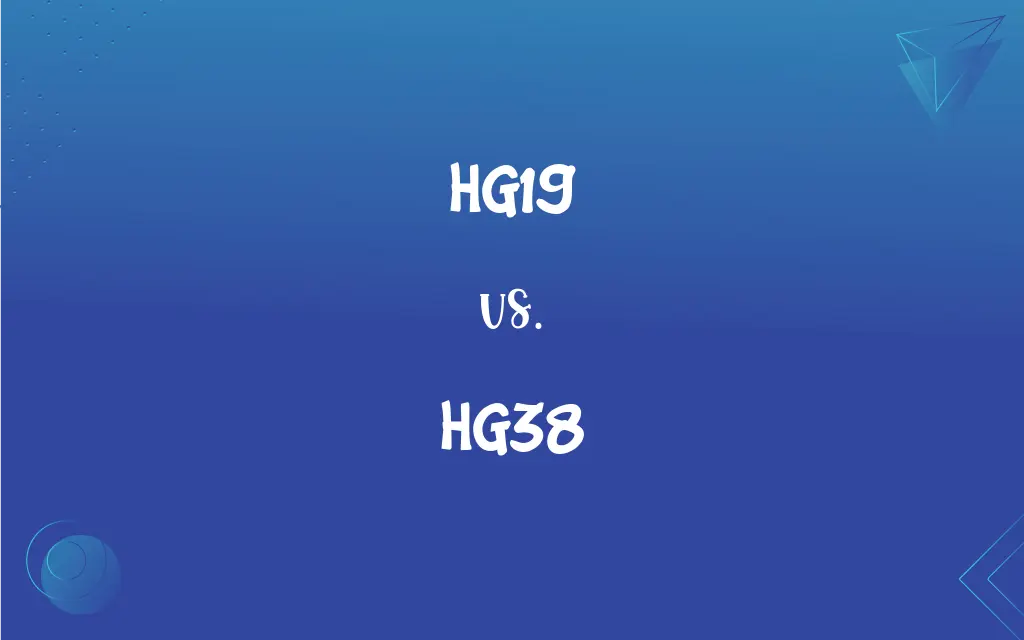HG19 vs. HG38: What's the Difference?
Edited by Aimie Carlson || By Janet White || Published on February 6, 2024
hg19 and hg38 are different versions of the human genome reference sequence, with hg38 being the more recent and comprehensive update of the two.

Key Differences
hg19 is an earlier version of the human genome reference sequence, widely used in genomic studies and bioinformatics. In contrast, hg38 represents a more recent and updated version of the human genome, offering improved accuracy and additional genomic information.
hg19 has been a standard for many genomic projects, while hg38 includes numerous corrections to errors found in hg19. hg38 provides a more accurate representation of the human genome, incorporating newer data and better technology.
The hg19 assembly is known for its compatibility with a vast array of existing genomic data and studies. On the other hand, hg38 offers enhanced mapping efficiency and variant interpretation, thanks to its updated structure and added sequences.
hg19's utility lies in its long-standing use and familiarity within the scientific community. However, hg38 surpasses it by providing a more detailed and comprehensive map of the human genome, facilitating advanced genomic research.
In the context of bioinformatics tools and databases, hg19 is still widely supported. However, hg38 is increasingly becoming the preferred choice for new studies, due to its improved accuracy and representation of genomic diversity.
ADVERTISEMENT
Comparison Chart
Release Date
Released in 2009
Released in 2013
Accuracy
Less accurate, with some errors
More accurate, with corrections
Sequence Content
Less comprehensive
More comprehensive, includes additional sequences
Use in Research
Extensively used in past research
Increasingly used in current research
Technology Basis
Based on earlier sequencing technologies
Utilizes advancements in sequencing technology
ADVERTISEMENT
HG19 and HG38 Definitions
HG19
Hg19 is known for its historical significance in genomics.
Hg19 played a crucial role in the early days of genome-wide association studies.
HG38
Hg38 is the latest reference sequence of the human genome.
Genomic studies now predominantly use hg38 for more accurate analysis.
HG19
Hg19 is an older reference sequence of the human genome.
Many genetic studies conducted before 2013 used hg19 as their genomic reference.
HG38
Hg38 reflects the advancements in genomic sequencing technology.
Thanks to hg38, researchers can now explore parts of the genome that were previously inaccessible.
HG19
Hg19 is a foundational resource in human genetics research.
Researchers referred to hg19 to study genetic variations in populations.
HG38
Hg38 is essential in modern genomic research for accurate mapping.
The new DNA sequencing data was aligned using the hg38 genome reference.
HG19
Hg19 serves as a basis for genomic comparison and analysis.
The genetic variant was identified by comparing it against the hg19 genome.
HG38
Hg38 provides a more comprehensive and corrected version of the human genome.
Hg38 includes regions that were missing or incorrect in hg19.
HG19
Hg19 is used in bioinformatics for mapping and analyzing DNA sequences.
Bioinformatic tools aligned the DNA sample to the hg19 reference genome.
HG38
Hg38 is a critical tool in bioinformatics, enhancing genetic analysis.
Bioinformatics algorithms utilize hg38 to detect genetic mutations more effectively.
FAQs
What improvements does hg38 have over hg19?
hg38 includes corrections of errors found in hg19, additional genomic sequences, and reflects updated sequencing technology.
When was hg19 released?
hg19 was released in 2009.
Has hg38 completely replaced hg19?
Not completely, but hg38 is increasingly becoming the standard due to its advantages.
Are there specific areas where hg19 is still preferred?
hg19 may still be preferred in studies requiring historical data compatibility or where specific hg19-based tools are used.
What is hg19?
hg19 is an older version of the human genome reference sequence, used for genomic comparisons and analysis.
Can I still use hg19 for genomic research?
Yes, hg19 is still usable, especially for compatibility with older data, but hg38 is preferred for newer studies.
What are the main differences between hg19 and hg38?
The main differences are in accuracy, comprehensiveness, and the technology used in their development.
How does hg38 benefit genetic research?
hg38 benefits genetic research by providing a more accurate and comprehensive genomic reference, aiding in better analysis and interpretation.
Is hg38 more accurate than hg19?
Yes, hg38 is more accurate and comprehensive than hg19.
How does hg38 impact variant interpretation?
hg38 improves variant interpretation by providing a more accurate genomic context.
Do bioinformatics tools support both hg19 and hg38?
Many bioinformatics tools support both, but newer tools might be optimized for hg38.
Which genome reference should I use for my genetic study?
It depends on your study's requirements, but hg38 is generally recommended for its accuracy and comprehensiveness.
Can I convert data from hg19 to hg38?
Yes, there are tools available to lift over genomic data from hg19 to hg38.
Is hg38 larger in size than hg19?
Yes, hg38 includes additional sequences, making it larger and more comprehensive.
Does using hg38 require more computational resources?
Yes, due to its larger size and complexity, hg38 may require more computational power.
Are all genetic databases updated to hg38?
Not all, but many major genetic databases have updated or are in the process of updating to hg38.
How do hg19 and hg38 affect genetic variant discovery?
hg38 allows for the discovery of more accurate and potentially novel genetic variants compared to hg19.
What are the challenges of switching from hg19 to hg38?
Challenges include data compatibility, updating analysis pipelines, and re-analyzing previously hg19-based data.
Why was hg19 replaced by hg38?
hg19 was replaced due to the need for a more accurate and comprehensive human genome reference.
Is training in genomics required to understand the differences between hg19 and hg38?
Basic genomics knowledge helps, but many resources are available to aid non-experts in understanding these differences.
About Author
Written by
Janet WhiteJanet White has been an esteemed writer and blogger for Difference Wiki. Holding a Master's degree in Science and Medical Journalism from the prestigious Boston University, she has consistently demonstrated her expertise and passion for her field. When she's not immersed in her work, Janet relishes her time exercising, delving into a good book, and cherishing moments with friends and family.
Edited by
Aimie CarlsonAimie Carlson, holding a master's degree in English literature, is a fervent English language enthusiast. She lends her writing talents to Difference Wiki, a prominent website that specializes in comparisons, offering readers insightful analyses that both captivate and inform.






































































